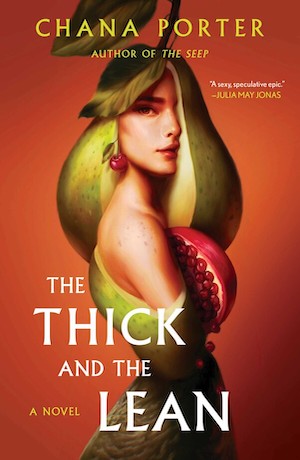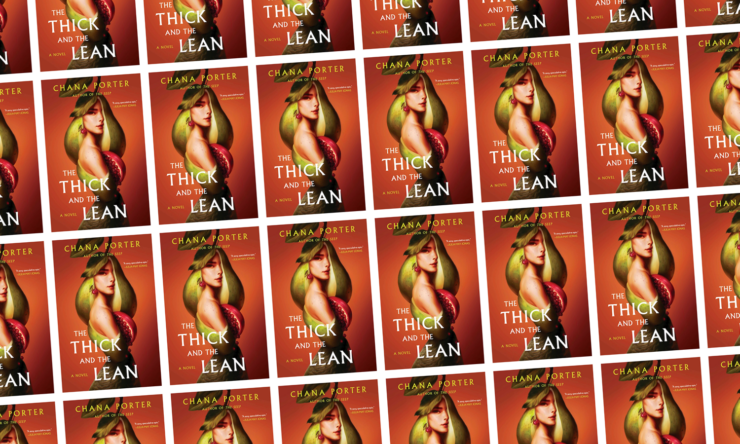CW: disordered eating, body dysmorphia
The most immediately noticeable thing about Chana Porter’s The Thick and the Lean, particularly for a reader who had an aggressively heteronormative upbringing, is how easy it was to buy into a world where body image and food are two key pillars of a fundamentalist religion. Speculative fiction is more often than not an exploration of contemporary problems, and Chana Porter follows this tried-and-tested practice with a wry sense of lived experience. Namely, while fatphobia and body dysmorphia are universal blights on all of humanity, they’re often characterized as feminine issues that have had an especially noxious impact on women. For all our scraps of progress, it’s still an ongoing struggle to escape what remains a commercial world that glorifies thinness, and despite its flaws, it’s the book’s connection with this exhausting reality that makes Porter’s fiction so resonant.
The Thick and the Lean tells parallel stories of Beatrice and Reiko—two very different teens on an alternate future Earth that’s also experiencing a climate crisis. The former is part of a polygamous religious cult called Seagate where real food is taboo, everyone does regular weigh-ins, and ideal women devote their lives to becoming waif-like Flesh Martyrs; the cult also encourages sex early and often among their youth, often in the form of church-organized sleepovers. Seagate is run by the Stecopo mega-corporation, which has special interests in agriculture, nutritional supplements, and pharmaceuticals. Beatrice, however, secretly loves eating, and is determined to learn to cook at the risk of her safety and sanity. Reiko is from the lowest, poorest part of the city—a routine dystopian vertical hierarchy where the wealthiest live Above and never have to touch the ground. As an indigenous Free-Wah, Reiko’s food-centric culture becomes an issue when she wins a scholarship to a prestigious university in the pleasantly banal hub of The Middle. As she confronts the bitter truth of her situation, she resolves to carve out a better life for herself.
The Thick and the Lean employs one of my favorite frameworks—a bildungsroman revolving around a story-within-a-story that holds world-changing potential. This particular structure often leans on “traditional” stories (usually presented as journals or fable-like narratives) not just to imbue the main plot with layers of meta-meaning, but as a statement on authenticity and the role of storytelling as a kind of transformative, paradigm-shifting alchemy. The same goes for food. Beatrice and Reiko, both on very different paths, take solace in the same treasure: The Kitchen Girl, a mysterious old tome that doubles as a memoir and recipe book.
One thing Porter does well is the way she exploits the reader’s existing knowledge of technology as a highly effective shortcut to a much more hyperbolic future. Most of the time, moving through the world via Beatrice or Reiko feels effortless because of the ultra-streamlined health and wellness marketing we’re so familiar with today—“nutritious” meal replacements, plant-based foods made to resemble meat, influencers touting buccal fat removal, and luxury exercise-as-amenities like Peloton and on-demand workout programs. Many already worship at these altars, and its manifestation into full-fledged religion is simultaneously droll and disturbing. The Thick and the Lean is also very much the product of a post-Handmaid’s Tale literary landscape; I don’t just mean the sensation of the popular Hulu show (at least, the first season), but the specific flavor of fundamentalist white dystopia that Margaret Atwood first wrote about in the mid-80s that has since become, for better or for worse, a defining part of how Americans discuss their political landscape today. Porter’s novel may be woven from the same DNA, but has a much fresher appeal that speaks to a wider audience.
Buy the Book


The Thick and the Lean
At times, reading this future facsimile of present-day social paradigms can feel tedious, through no fault of Porter’s crisp prose, but because of the very specific convergence of so many highly-politicized personal issues. When Beatrice realizes that fully embracing food has made her fat, it inadvertently conjures the same kind of enthusiastic self-empowerment rhetoric so common on social media. When the book starts expanding on the climate crisis and extreme flooding that catalyze later events in the story, Beatrice, ever the pragmatist and forager, becomes focused on styling plants as substitutes for meat; in this context the plant-based details here have added weight because rich gourmands, seeking the thrill of real food, are wont to eat meat as a sort of cannibal-esque spectacle. It’s an interesting extension of what we’ve seen with notable plant/vegetable advocates like Yotam Ottolenghi and Simon Hopkinson (and even Michael Pollan) who have written extensively on preparing plants and vegetables like meat, and some of the most joyful prose in the book is, unsurprisingly, devoted to depictions of Beatrice’s experiences with food.
This isn’t to say that Porter has chosen to beat several dead horses in the form of a novel, but found a way to create a supremely pleasurable read that (sometimes rather heavy-handedly) forces the reader to examine their own relationship with food and their body. I’m not sure whether there’s an uncanny valley-like term for this in speculative fiction, but it makes me uncomfortably self-aware as a reader to actively examine what reading fiction about fatness and food (and all their related issues) does to my brain, not to mention the ongoing existential anxiety over our deteriorating planet. In Reiko’s chapters, Porter also spends a great deal of time and care poking at the small, ugly details of class politics, socially acceptable grifting, the trials and tribulations of aspirational class, and the performance of quiet luxury. The result is a much more indulgent, fragile complement to Beatrice’s more grounded chapters, strengthened by Porter’s tendency to favor foreshadowing (albeit very explicitly foreshadowing) and inference over spelling out every narrative twist.
It isn’t a stretch to take the banal modern-day cults of SoulCycle, cryotherapy, and intravenous vitamin treatments—all routine parts of the landscape in my old neighborhood, West Hollywood—and evolve them into a monstrous, all-encompassing doctrine that demands virtue through dieting and starvation. Throughout the book, I found myself oscillating between the various stages of my past where food and eating and body image had, for better or for worse, dominated my everyday life; in retrospect these phases had mostly been for the worse, and I’ve been learning, very slowly, to define my own relationship with health and beauty on my own terms. Beatrice and Reiko, as well as many other people I know, are learning to do the same; Reiko and her heavenward trajectory, however, is the real secret sauce of the story, and I came away feeling serene in the knowledge that she was doing exactly what she was intended to do. The Thick and the Lean wound down with a somewhat predictable but satisfying coda, and while there’s nothing particularly novel about the meat of its story (and there doesn’t have to be), Porter’s clean, evocative writing left me both sated and hungry for more.
The Thick and the Lean is published by Saga Press.
Alexis Ong is a freelance culture journalist with weak ankles who mainly writes about games, tech, and pop culture. Her work has appeared in The Verge, Polygon, Kotaku, Rock Paper Shotgun, VICE, Dazed Digital, and more; soft spots include science fiction, internet archaeology, comics, boxing, and old games. You can find her at her website or on Twitter.










